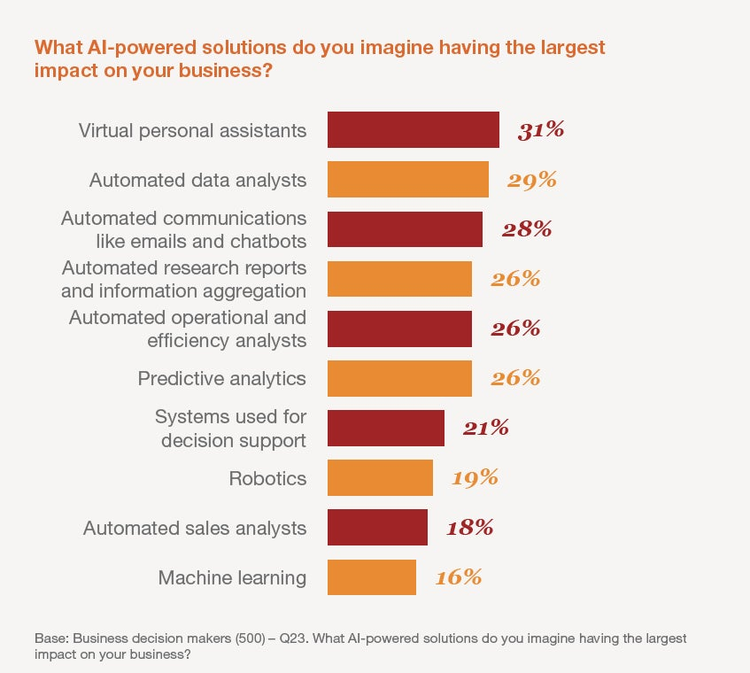PwC: Artificial Intelligence Will Be The Business Advantage Of The Future
A new survey shows U.S. consumers and business decision makers are most optimistic about AI’s potential to increase efficiencies with automated communications and alerts to enable more proactive approaches.

Business decision makers are optimistic about artificial intelligence and the impact it will have on their businesses, according to a new study by PwC.
“A Revolutionary Partnership: How AI Is Pushing Man And Machine Closer,” a survey of 2,500 U.S. consumers and business decision makers, found that business leaders, specifically, believe AI is going to be fundamental in the future. In fact, 72% termed it a “business advantage.”
Business decision makers said they are most optimistic about AI’s potential to increase efficiencies with automated communications and alerts to enable more proactive approaches (70%) and to improve big data analytics (59%).
Additionally, PwC found, AI has the potential to minimize customer service pain points, with consumers beginning to prioritize AI service experiences over human contact. PwC found 62% of consumers are confident that AI can reduce the time required to answer their questions while still providing feedback highly tailored to their preferences. Nearly two-thirds of business decision makers (63%) also believe AI can offer a “superior one-to-one personalized experience.”
“Incorporating AI into personalized marketing strategies is a huge opportunity—and need—for today’s marketer,” said Matt Lieberman, director at PwC. “Consumers are excited about the potential for AI to make transactions more personalized and efficient, yet the loss of the human touch is a major concern.”

The majority of consumers surveyed said they believe AI will help solve problems that plague modern societies (63%) and help people live more fulfilling lives (59%). PwC’s study also found that consumers care less about privacy and security if the tech will help advance health care or improve cities. Fifty-seven percent of respondents said they would share their personal information to further medical breakthroughs, and 62% would share their data to help relieve traffic in their cities.
Additionally, people believe AI can potentially close resource gaps, with 40% of consumers who said it will expand access to financial, medical, legal, and transportation services to those with lower incomes. And more than half of consumers said they believe AI will provide educational help to disadvantaged schoolchildren.
“While there is huge potential for AI to make the world better, it is ultimately the responsibility of humans to coach and optimize it to meet consumers’ wants and needs,” Lieberman said. “In this evolving world, every marketer needs to think like a teacher, director, or mentor. We will determine where and how machines will learn, identifying the appropriate data, guiding the training process, and refining the outputs. We’ll also need to champion a new kind of teamwork, which sets goals for man-machine teams, delegates tasks for productivity, and applies the insights to new areas. Above all, we must never lose sight of the human experience, even as we embrace automation and new ways of working.”